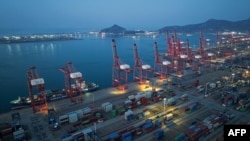U.S. President Donald Trump’s decision to impose 10% tariffs on Chinese goods has been met with mixed reactions from Beijing, with the Chinese government threatening to roll out countermeasures and some Chinese businesses expressing concerns about potential disruption to their exports to the U.S. market.
While the Chinese Ministry of Commerce vowed to challenge the Trump administration’s move at the World Trade Organization, the Chinese foreign ministry emphasized that the trade and tariff wars “cannot solve the U.S. problems at home and more importantly, does not benefit either side.”
Trump previously said the additional tariffs on Chinese goods were Washington’s response to China’s role in manufacturing precursor chemicals essential to fentanyl production in Mexico.
“Additional tariffs are not constructive and bound to affect and harm the counternarcotics cooperation between the two sides in the future,” a Chinese foreign ministry spokesperson said in a statement released Sunday afternoon.
Meanwhile, on the Chinese social media platform Weibo, some internet users said the Trump administration’s move would only backfire and harm American consumers’ interests while others said Washington’s response “lacks creativity.”
“In the end, he only dares to add 10% tariffs [on Chinese goods] while imposing an additional 25% tariffs on goods from other countries,” wrote Chinese internet user “Jixiang Wang-bao” on Weibo.
Compared to the defiance expressed by some Chinese internet users, some Chinese exporters say they think the additional tariffs would still harm their businesses.
“The additional tariffs will essentially force my company to give up the U.S. market and shift the focus to other countries,” a Chinese consumer electronics exporter surnamed Lin, who asked to only be identified by his last name due to the sensitivity of the issue, told VOA in a written response.
Hu Xijin, the former editor-in-chief of China’s state-run tabloid Global Times, said that while Chinese companies focusing on exporting to the U.S. would experience varying degrees of challenges, the Chinese economy is capable of dealing with the impact of these additional tariffs.
“All parties in China have long anticipated this round of tariff hikes imposed by Trump and relevant businesses in China have made a lot of preparations,” he wrote in a post on Weibo, adding that the Trump administration’s tariff war against China would ultimately harm American consumers and suppliers.
Leave room for negotiations
While there are differing views about how the additional tariffs might affect the Chinese economy, analysts say the Trump administration’s decision to start with a 10% tariff against Chinese goods shows Washington’s willingness to negotiate with Beijing.
“The Trump administration may use the 10% tariff as a way to push Beijing to reach deals on some issues that are important to the U.S., such as the fentanyl crisis, and show the Chinese government that it could further increase the tariffs to 60% if China is unwilling to engage in negotiation,” said Wu Se-chih, an expert on Chinese politics at Taipei University of Marine Technology.
Since the Chinese economy remains sluggish, Wu said Beijing is trying to respond to the additional tariffs imposed by the Trump administration with less confrontational measures such as filing a claim with the WTO.
“China is hoping to show Washington that it is willing to come to the negotiating table and use negotiations to prevent the Trump administration from further enhancing the tariffs on Chinese goods,” he told VOA by phone.
Other experts say that the lower tariffs that the Trump administration has imposed on China, compared to the 25% tariffs on goods from Mexico and Canada, suggest Beijing may have already begun negotiations with Washington.
“China could announce a massive order of Boeing or China could announce a massive increase in imports of shale gas, which could be very useful for Trump,” Alicia Garcia-Herrero, chief economist for Asia Pacific at French investment bank Natixis, told VOA by phone.
While China may be more prepared to cope with the impact of tariffs imposed by the U.S. due to experiences from Trump’s first term in office, some Chinese economists said the additional tariffs could still seriously affect China’s economic growth.
“The Chinese economy will still be hit hard by the additional tariffs imposed by the Trump administration because China has been relying on export to drive economic growth in recent years,” He Jiangbing, an independent Chinese economic commentator, told VOA by phone.
Garcia-Herrero said while Trump begins his second term by imposing additional tariffs on Chinese goods, the trade imbalance won’t be the main source of tension between China and the U.S. over the next four years.
“Escalation of tension between China and the U.S. will come from important national security issues such as Taiwan and the U.S. military deployment in the Philippines,” she told VOA.






